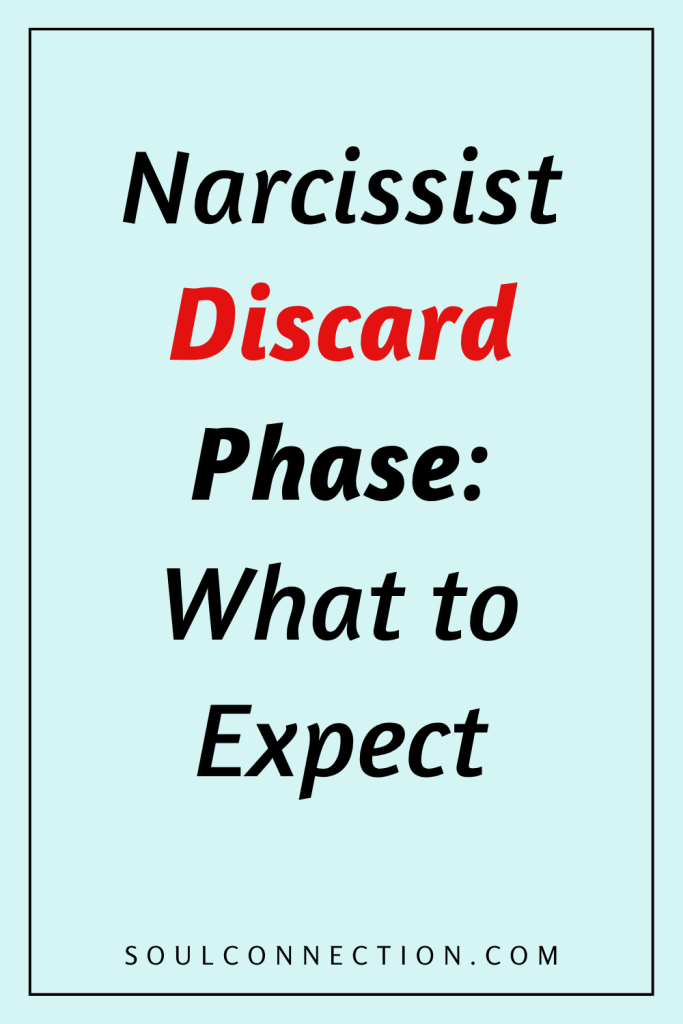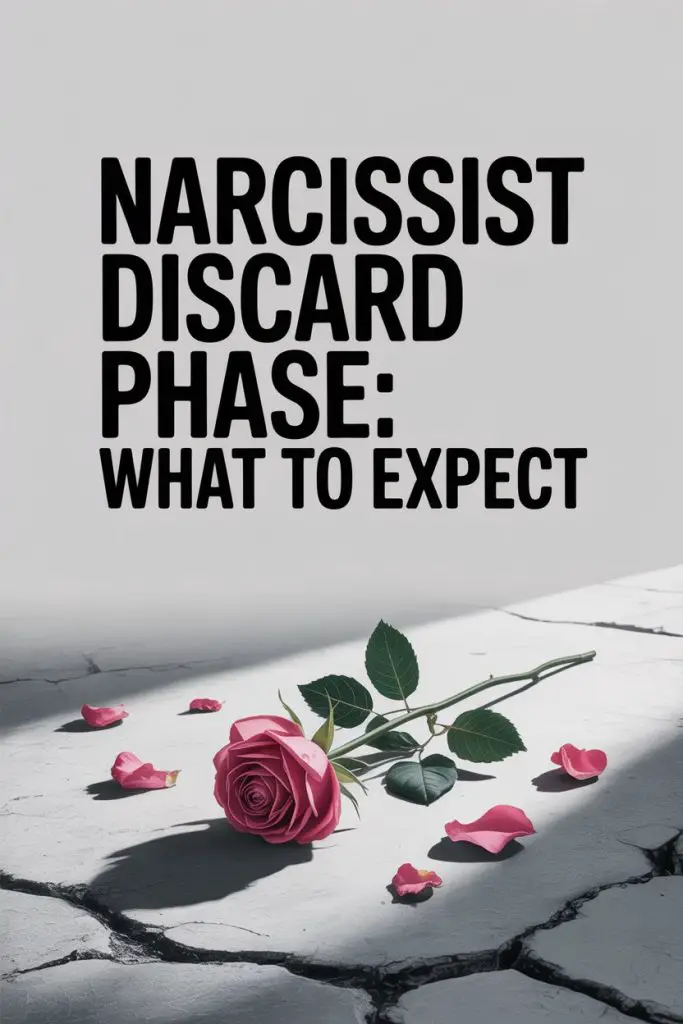Welcome to the part of your relationship where you realize that the roller coaster you’ve been riding with a narcissist has just come to a screeching halt—and maybe you’re still upside-down.
If you’re currently in the “discard phase,” or suspect it’s lurking around the corner, grab a cuppa and settle in. Things are about to get bumpy, but a little knowledge (and a dash of sarcasm) can make the wild ride a bit easier to handle.
What the Discard Phase Looks Like
Suddenly, the charming, attentive partner who once couldn’t get enough of you disappears—sometimes literally. Calls go unanswered, texts are left on read, and any attempt at a heartfelt conversation is met with the emotional equivalent of a brick wall.
The narcissist has essentially pressed the “mute” button on your existence.
Expect a rapid shift from “soulmate” to “stranger on a bus.” You might even get the cold shoulder with a side of ghosting or, for the truly dramatic, a public breakup that rivals the plot twists of a telenovela.
This isn’t about anything you did or didn’t do. The discard phase is less a reflection of your worth and more a sign that the narcissist has drained what they wanted from the relationship, or they’ve found a new audience for their greatest hits.
Signs the Discard Is Underway
Spotting the discard phase isn’t always easy—narcissists are nothing if not unpredictable. That being said, there are some classic signals:
- Emotional withdrawal. Suddenly, your partner pops up less than your local bus, and when they do, it’s with the enthusiasm of a cat in a bath.
- Increased criticism. Everything you do is wrong. Breathing too loud? Unacceptable. Existing? How dare you.
- Triangulation. Suddenly, there’s a new “friend” or ex they talk about. They may even compare you—just to watch you squirm.
- Gaslighting ramps up. Reality feels like a slippery fish. Did they really say that? Were you dreaming? Spoiler: you weren’t.
- Outright abandonment. One day they’re there. The next, their side of the closet is emptier than a politician’s promises.
Each sign might play out with a different flavor, but the recipe is always the same: devaluation and detachment.
Why the Discard Hurts So Much
Let’s just say that breakups are never fun, but narcissist discards pack a special punch. It’s not simply about heartbreak—it’s about confusion, loss of self-worth, and feeling like you’ve just been voted off an island you thought was paradise.
Narcissists have a knack for idealizing their partners early on (the infamous “love bombing” phase). The whiplash from adored to ignored leaves you questioning everything—your memory, your value, your taste in partners (ouch).
It’s not just missing the person; it’s missing the person you thought they were. Spoiler: that version never really existed.
The Psychology Behind the Discard
Why do narcissists discard? Simple: supply and demand. Narcissists feed off attention and admiration—what’s called “narcissistic supply.”
When they feel you’ve stopped serving their ego or someone shinier has entered the chat, the discard phase kicks in.
If you’ve started standing up for yourself or expressing needs (how dare you!), you’ve challenged their image of control. That’s the equivalent of taking away a toddler’s favorite toy.
Cue meltdown—or, more often, a swift exit.
The discard isn’t always permanent, though. Narcissists are famous for boomeranging back the moment their new supply dries up, or they fancy a bit more drama.
Common Tactics Used During the Discard
Narcissists aren’t known for creativity, but they do have a playbook for discards. Expect some (or all) of the following:
- Silent treatment. A true classic. Like a radio station that stopped broadcasting, they vanish with zero explanation.
- Smear campaigns. Suddenly, you’re the villain in a story you didn’t know you were starring in. Friends, family, and mutuals might get an earful.
- Love bombing someone new—publicly. If you ever wanted to see your replacement paraded about, now’s your chance!
- Blame shifting. Everything that went wrong? Clearly your fault. (Did you not get the memo?)
- Minimal closure. If you’re expecting a heart-to-heart or a sincere explanation, bring snacks and a blanket. You’ll be waiting a while.
These tactics serve to protect the narcissist’s ego and control the narrative, ensuring they look like the misunderstood hero while you’re left in the emotional gutter.
How to Take Care of Yourself During the Discard
Here’s where the rubber meets the road. Surviving a narcissist’s discard means shifting the focus back to yourself—something you probably haven’t been allowed to do in a while.
- Reconnect with reality. The relationship was built on smoke and mirrors. Reach out to friends and family who knew you before you started doubting your own name.
- Set boundaries (and stick to them). Give yourself permission to block, mute, or delete. The less oxygen you give to their drama, the quicker it fizzles.
- Own your story. The narcissist will try to rewrite history. You get to decide what’s real and how you move forward.
- Focus on self-care. Yes, bubble baths are cliché. They also work. So does therapy, journaling, and smashing a pillow or two.
- Don’t retaliate. Revenge fantasies are fun, but the narcissist thrives on drama. Starve the beast by refusing to play.
Expect Hoovering
Just when you’ve started to piece yourself back together, there’s a knock at the door—or a “Hey, stranger…” text at 2 a.m. This is hoovering, and it’s as pleasant as it sounds.
Hoovering involves sudden, often dramatic, attempts to suck you back in. Apologies (fake), grand gestures, or reminders of “all the good times”—all designed to test if you’ll let them back into your life.
Spoiler: nothing has changed except their supply is running low.
Responding only reignites the cycle. Silence isn’t just golden—it’s bulletproof.
Handling Smear Campaigns Like a Pro
Word gets around that you’re suddenly the villain. Welcome to the smear campaign—a narcissist’s favorite pastime after self-admiration.
- Stay calm. Over-explaining only makes you look guilty. Let your actions show your true character.
- Tell your truth to those you trust. Most reasonable people can spot a one-sided tale from a mile away.
- Don’t get sucked into the drama. Life’s too short to play defense against someone else’s fiction.
The people who matter will stick around. The rest probably weren’t on your team anyway.
The Temptation to Return
The discard phase can leave you aching for any sign of your old partner—even if you know it’s an illusion.
Nostalgia is a powerful drug, especially when withdrawal symptoms include loneliness, self-doubt, and a sudden urge to scroll through old photos.
Remind yourself: you’re missing who you thought they were, not who they are. The narcissist’s greatest trick is convincing you that the love-bombing phase was real and the discard is your fault. Neither is true.
Resist the urge to re-engage. Your sanity will thank you.
Rebuilding Your Sense of Self
Emerging from the discard phase will require more than a new haircut and a pint of ice cream—though both are highly recommended.
- Rediscover old interests. That hobby you abandoned to please your ex? Dust it off.
- Reaffirm your values. Narcissists corrode your self-esteem by chipping away at your beliefs. Re-anchor yourself.
- Seek professional support. Therapy isn’t just for “broken” people; it’s for anyone who wants to get stronger.
Healing is neither linear nor quick, but every step away from the chaos is one toward yourself.
What Healthy Relationships Feel Like
After a stint with a narcissist, normal relationships might feel boring.
No drama? No guessing games? No sudden emotional hurricanes? You might even mistake stability for dullness.
Here’s the kicker: healthy love feels safe. Predictable, even.
You get to be yourself and know that you’re valued just as you are. No eggshells required.
Healthy partners communicate, respect boundaries, and don’t rewrite history to suit their egos. Sounds revolutionary, right?
When the Dust Settles
The discard phase is brutal, confusing, and, let’s be honest, a masterclass in emotional whiplash. But here’s the not-so-secret secret: you can come out of it not just intact, but wiser and more grounded than before.
Narcissists know how to make an exit, but they can’t take away your future. The more you focus on rebuilding, setting boundaries, and calling in genuine support, the less sway they have over you.
The discard isn’t the end of your story. It’s the point where you take back the pen.
Trust yourself. Trust what you know.
And if all else fails, trust that there’s a whole world out there full of people who aren’t plotting their next dramatic exit.


